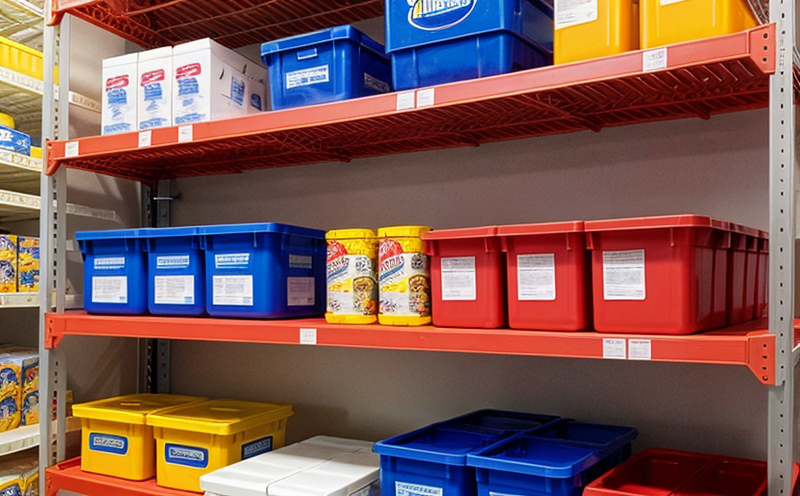ISO 91342 Oxidative Stability Profiling in Margarine
The ISO 91342 standard provides a comprehensive framework to evaluate oxidative stability in fats and oils, which is crucial for ensuring the quality of food products like margarine. Oxidative stability refers to how well an oil or fat resists rancidity by preventing oxidation reactions that lead to off-flavors and reduced shelf life. For margarine specifically, maintaining high levels of oxidative stability ensures consistent product quality, prolonged shelf life, and improved consumer satisfaction.
Understanding the oxidative stability profile is essential for several reasons. First, it helps identify potential issues early in the production process, allowing adjustments to be made before large-scale contamination occurs. This not only enhances food safety but also minimizes waste and cost associated with product recalls. Secondly, knowing the oxidative stability profile aids in optimizing storage conditions and packaging materials to extend shelf life effectively.
The testing method outlined in ISO 91342 involves exposing samples of margarine to controlled oxygen environments under accelerated conditions that mimic real-world scenarios but at a faster pace. This allows for rapid assessment without compromising accuracy. The oxidation process is monitored using various chemical indicators and analytical techniques, including thiobarbituric acid (TBA) number determination, peroxide value measurement, and total polar compounds analysis.
Real-world applications of this test are numerous across the food industry. Quality managers use these results to ensure that new formulations meet regulatory requirements and customer expectations. Compliance officers rely on them to demonstrate adherence to international standards like ISO 91342 when dealing with audits or certifications. R&D engineers leverage oxidative stability data to innovate products by improving shelf life without compromising taste or texture.
For procurement teams, understanding the oxidative stability profile helps select suppliers who consistently deliver high-quality raw materials. By investing in thorough testing early on, companies can build trust with customers and maintain their reputation for delivering premium products. Ultimately, mastering ISO 91342 ensures that margarines remain fresh longer, enhancing overall consumer experience.
Given the importance of this test, Eurolab offers advanced facilities equipped with state-of-the-art instruments capable of performing rigorous analyses according to ISO 91342 guidelines. Our team comprises experts familiar with both theoretical aspects and practical implementation, ensuring accurate results every time.
Why It Matters
The oxidative stability profile plays a critical role in maintaining the integrity of food products like margarine by preventing premature spoilage caused by oxidation reactions. These reactions not only affect flavor but also contribute to potential safety concerns if left unchecked. By adhering to ISO 91342, manufacturers can ensure that their products meet stringent quality standards set forth internationally.
One major concern is the impact of prolonged exposure to air during transportation and storage. Oxygen present in these environments promotes oxidation, leading to decreased nutritional value and increased risk of microbial growth if conditions aren't managed properly. Regular monitoring through tests like those described in ISO 91342 allows for proactive interventions aimed at mitigating risks associated with oxidative degradation.
Another factor worth considering is temperature fluctuations throughout different stages of production and distribution processes. Higher temperatures accelerate the rate of oxidation, making it more challenging to maintain desired shelf lives unless appropriate measures are taken. Implementing effective cooling systems or selecting suitable packaging materials can help counteract these adverse effects.
In addition to safeguarding against spoilage issues, understanding oxidative stability also contributes positively towards sustainability efforts within the food industry. By extending product freshness periods, less waste occurs as unsold items don't need to be discarded prematurely due to spoilage concerns. This translates into reduced environmental impact and lower operational costs for businesses.
Finally, consumer trust plays a significant role in determining brand loyalty. When consumers know that their preferred products consistently meet high quality standards, they are more likely to continue purchasing them over time. Ensuring consistent oxidative stability profiles through rigorous testing instills confidence among customers about the reliability of brands they support.
Benefits
Ensures compliance with international standards such as ISO 91342, enhancing reputation and credibility.
Maintains consistent product quality across batches, reducing variability and ensuring uniformity in flavor profiles.
Promotes longer shelf life by identifying weak points early on, allowing for corrective actions to be implemented promptly.
Reduces the likelihood of recalls or withdrawals due to safety concerns linked with oxidation-induced spoilage.
Informs formulation adjustments based on scientific insights gained from detailed analysis results.
Supports sustainable practices by minimizing waste and extending product usability, thus reducing resource consumption.





